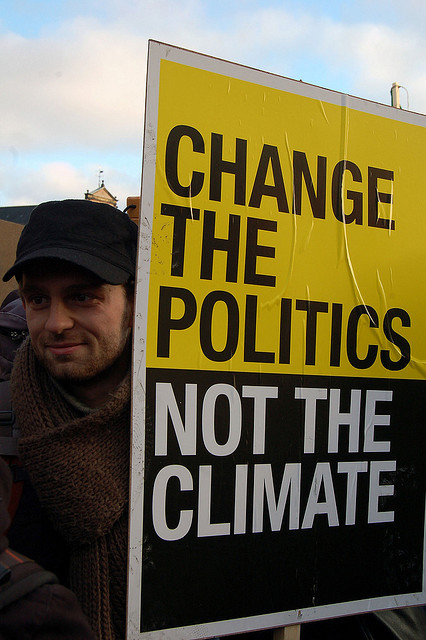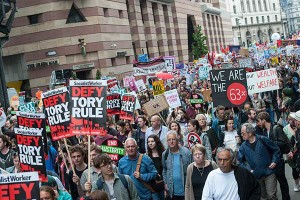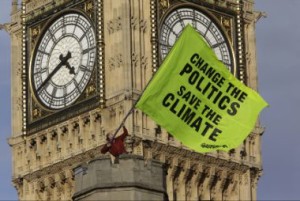
The UK’s 2020 general election could be as historically critical as Germany’s in 1933, argues John Wright.
The Nazis achieved power in Germany not by winning the support of a majority of the electorate, but via street-thuggery, murder and political deceit.
In the March 1933 Reichstag Election Hitler gained 37.3% of the vote against the combined votes of his political opponents of 37.7% i.e. the votes cast for the Communists, the Social Democrats and the Centre Party.
It was not a fair election by any stretch of the imagination: the opposition parties’ workers were subjected throughout the campaign to a barrage of violent attacks by Hitler’s Brownshirts: party offices were wrecked, printing presses smashed, meetings broken-up, party activists savagely beaten, dragged off to concentration camps, tortured and often murdered. However, as the party which received the largest share of the vote, the National Socialists came to power.
I am not seeking to draw a parallel between the Tories and the Nazis but the voting statistics in last May’s UK General Election threw-up an eerily close resemblance to the result in Germany’s 1933 election. Hitler took power with 37.3% of the vote; here, the Tories took power with 36.9% of the vote (a mere shave of 0.4% off Hitler’s share of the vote). In 1933 Germany, the opposition anti-Nazi parties together out-polled Hitler by 0.4%. In 2015 UK Labour and the Lib Dems together out-polled the Tories by 1.4%.
The fragmentation of the ‘anti-Nazi’ vote in Germany was a global disaster: by the time Hitler committed suicide in April 1945, sixty million people had died worldwide as a consequence of his coming to power. Before that election, the Communists, the Social Democrats and the Centrists clearly understood the need for a broad, cross-party anti-Nazi front. It was discussed and argued for by members of all three parties. But in practice, for reasons which are still hotly debated today, the anti-Nazi parties were not able to bring-off the ‘broad front’ as a practical political project.
In a Sodium Haze article last November I tried to show the potential potency of a centre-left broad front approach to UK general elections (link). In only one election in the last 70 years has the Tory’s proportion the vote exceeded the proportion cast for the Labour Party and the Liberal Party (Alliance/ LibDems) combined. That was in 1953, when the Tory vote nudged ahead by a slim 0.7%. Even in the 1979 ‘Nightmare on Downing Street’ election Mrs. Thatcher only managed 43.9% of the vote compared to the Labour/Liberal combined vote of 53.7%. In last May’s election the Tory party failed, yet again, to gain the support of a majority of voters.
Now, according to last week’s Independent on Sunday, Jeremy Corbyn and Tim Farron are discussing the possibility of creating an anti-Tory broad front to fight the 2020 general election, and are hoping to bring on board the Greens, the SNP and Plaid Cymru (link). The primary goal, it seems, would be to bring about electoral reform, scrapping once and for all the fist past the post system; but there are many other policy goals which could be up for grabs: an anti-austerity approach to bringing down the national debt, scrapping Trident (or at least, promising a referendum – which could hold Labour together plus give time for the British public to give measured consideration to the wisdom of our hanging on to such an irrelevant and grotesquely priced weapon) and an environmental programme linked to growth and investment which will make a credible attempt at bringing down carbon emissions.
I believe the last would be the most important aim of an anti-Tory broad front, as it seems, since last May, that the government’s enthusiasm for environmental issues has gone off the boil: support for the renewables industry has been reined in and regulations now permit government to over-rule local community objections to fracking but uphold local objections to on-shore wind turbines.
So, no, Cameron, Osborne, May et al are not the new Nazis, but the 2020 general election could have historic, global significance even greater than the 1933 election in Germany. Climate catastrophe is already causing massive global disruption in poorer countries; Christian Aid estimates that by the end of the century 200 million people will have died in Africa alone as a result of the effects of global warming.
The creation of a centre-left broad front with a serious commitment to taking the lead to avert global climate catastrophe (for a start, by joining David Attenborough in backing the Global Apollo Programme, drawn-up by the world’s leading scientists) has potentially profound significance for all our futures and would be the greatest political legacy the ordinary members and the leaders of the centre-left parties and their leaders could possibly strive or wish for.
John Wright


More Stories
Navalny’s death used to hide western failures in Ukraine and their support for Israel’s genocide
Gifts from Gaza
Vulture capital circles over the corpse of Ukraine…